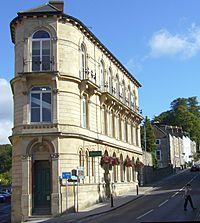Frome Museum facts for kids
 |
|
| Lua error in Module:Location_map at line 420: attempt to index field 'wikibase' (a nil value). | |
| Location | North Parade, Frome, Somerset, England |
|---|---|
| Collection size | approximately 23,000 items |
Frome Museum is a cool place in Frome, Somerset, England. It shows off the history of the local area. The museum has a really special collection of items from a bronze factory called J.W. Singer.
Contents
What You Can See at Frome Museum
The museum has two main rooms where you can see lots of interesting things. There's also a library full of books and old documents. You can find many items from local industries, old maps, and photographs.
Local History and Industry Displays
The museum's collections include old objects and historical items that tell the story of how Frome and its surrounding areas grew over time.
- One display focuses on the Butler and Tanner printing company from the town. You can even see an old printing press!
- Another section shows photos, diagrams, and tools from James Fussell's Ironworks in Mells.
- Look out for a special lamp made by the Cockey family. It has a cool Art Nouveau style. More than 60 of these lamps can still be seen around Frome today.
- Other displays feature items from Bussman Cooper (later Beswicks), a fire engine from Marston House, and tools from local blacksmiths.
- You can also explore a recreated Chemist's Shop from Bath Street and see a collection of Victorian and later costumes.
The Amazing Story of J.W. Singer & Sons
The museum has a huge collection of photos, glass negatives, and metal artworks from a local company called J.W. Singer & Sons Ltd.
How Singer's Bronze Factory Started
John Webb Singer was born in Frome. He started his bronze factory in 1851. At first, his company made brass decorations for local churches. They became very well-known because of a movement within the Church of England that made people want more church ornaments.
Famous Statues Made by Singer's
Besides church work, the company became skilled at making large statues. These amazing statues were sent all over the world!
- One of their first big statues was a copy of General Gordon riding a camel.
- Singer's also cast the famous bronze statue of Boudica with her daughters in her war chariot. This statue was ordered by Prince Albert and designed by Thomas Thornycroft. It was cast in bronze in 1902, many years after Thornycroft passed away. Today, you can see it next to Westminster Bridge and the Houses of Parliament in London.
- The statue of Lady Justice on top of the dome of the Old Bailey was also cast by Singer's. It was designed by the British sculptor F. W. Pomeroy.
- Another important statue they made was of Alfred the Great in Winchester.
The Museum Building's History
The museum is in a beautiful building that looks like an Italian palace. It was built in 1865 for John Sinkins. It was originally a Literary and Scientific Institute, a place for learning and discovery. The architect was J. Hine, and the builders were Carr and Pickford. This building is a Grade II listed building, which means it's an important historical structure. The Frome Historic Building Preservation Trust helped to preserve and restore the building.
 | James Van Der Zee |
 | Alma Thomas |
 | Ellis Wilson |
 | Margaret Taylor-Burroughs |

